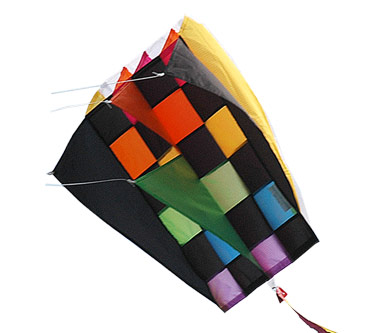May 09, 2006
Don't Listen to your Customers
In a very positive article on Google, Garret Rogers opines that one of Google's keys to success is this:
Give people what they want, not what you think they want.
Garret is right of course - product designers need to remove their own fragile egos from product design. But that is only half of the story....
Continue reading "Don't Listen to your Customers"May 10, 2006
Teaching Logo
This morning before work I have a special event. I will be visiting my son's second-grade class to try to teach a little programming.
We will be using Logo. Although the school is lucky enough to have a laptop for every student, they don't have any programming software on the computers. But naturally they do have web browsers. So I have set up a little web page here with the Turtle Tracks applet for the kids to try using.
Did you ever use Logo as a kid? It doesn't seem to be much in vogue these days, but it is still around, just as fun as ever.
Update: It went great! There is a spectrum of computer comfort in second grade - many kids had no problems zooming through, but others got confused by things like losing overlapping windows behind one another. We managed to get through most of the worksheet in an hour.
My favorite part of teaching second graders is their enthusiasm. "OK, so I told you I am going to teach you how to program a computer. Who wants to see the programming window?" (All hands go up.) "Okay, then press the Start button..."
When seven-year-olds see Logo's commandline prompt, they don't sit quietly. Twenty kids, all at once: "Ooooh wow! That's SO coooool!"
Who would have imagined opening a command window was SO cool?
May 11, 2006
Platform vs Product
An excellent article by Walt Mossberg in today's WSJ summarizes one of the core strategic tensions in the tech business:
Which works better? A focus on platform? Or a focus on products?
Microsoft has always bet on one; Apple on the other. Although the 1990s saw the dramatic victory of platforms over products in the PC business, Mossberg points to both the iPod and Xbox and observes that perhaps now the tide is turning the other way. (Here is iTunes vs API in Google Trends.)
Which way should a search engine company be run?
May 12, 2006
Wii Steals Show at E3
Reuters observes that Nintendo has stolen the show at E3.
Although the Wii didn't have any major secrets that hadn't already been revealed (audio in the remote, I guess was the last hardware secret), Miyamoto seems to have been proven right in his assertion that "it's not about the hardware, it's about the gameplay."
E3 this year has been dominated by the 6-hour waiting line to play the Nintendo Wii.
For a sense of the insanity, there is a video of the waiting line here. Naturally the blogosphere is also full of commentary about the E3 experience and the gameplay itself. (Also CNET has a review here.) The level of interest in the modest Wii system was a real suprise at a conference that most expected to be dominated by comparisons between the muscular next-generation offerings from Microsoft and Sony.
Hopeful that the level of interest at E3 is a hint at the level of demand there will be for the console, I'll be holding on to my bit of NTDOY.
May 13, 2006
Microsoft Bungling Bundling?
Danny Sullivan recently wrote about the failure of my former employer to bundle websearch:
I am nauseatingly exhausted by idea that Microsoft will conjure up some magical method of yanking people into its MSN Windows Live Whatever You Want To Call It search service via the Windows operating system or the Internet Explorer browser. Microsoft has failed for years to be successful in this, which is why it's amazing anyone would still believe it.
But Danny is wrong. Microsoft has not "failed for years" at bundling search - it not has even taken a swing at bundling search yet....
Continue reading "Microsoft Bungling Bundling?"May 18, 2006
The Other Side of the Planet
I am traveling this week. If, like me, you do not look forward to your next long plane flight, at least you can be satisfied that there are places on the planet that are even farther away.
This very cute tool by Ze Frank (via reddit) shows you the other side of the planet exactly and interactively. He seems to recommend using it as a tool to figure where to place two slices of bread to make an Earth sandwich.
Or maybe instead of flying you should stay at home and send your thoughts via email - in that case, Ze also has some handy communication tips for you. :)
May 24, 2006
Owning the Experience
 Lee Gomes observes in today's WSJ that the Wintel PC world lacks the "design mojo" that Apple has demonstrated in spades. And he suggests that the way to solve this would be for Microsoft and Intel to enlarge their certification programs to force better design quality in PCs.
Lee Gomes observes in today's WSJ that the Wintel PC world lacks the "design mojo" that Apple has demonstrated in spades. And he suggests that the way to solve this would be for Microsoft and Intel to enlarge their certification programs to force better design quality in PCs.
But Lee Gomes is wrong. "Certification programs" are not the solution. These programs - Viiv Certification, Media Center PCs, Windows Logo Certified, and Intel Inside stickers - these are all part of the problem. These programs work to arrange the industry for the benefit of Intel and Microsoft. But they have been a disaster for the rest of the PC industry.
At first glance, certification seems like a good thing. Why wouldn't a broad, clear, and rigid set of certification rules make for better products? The problem is that good design is not about following rules. Good design is about solving customer problems - rules be damned.
My children's nanny Elizabeth recently bought a new laptop, and I found her Bluetooth experience instructive...
May 26, 2006
Trains versus Planes
Yesterday's Amtrak delays on the northeast corridor made the headlines today.
I am glad I didn't decide to hop on the train for a quick trip to NYC yesterday. Lots of people who did had an unhappy day. From the Boston Globe:
"I'm going to take a long, hard look at the Delta shuttle next time," said Jeff Oppenheim, a New York actor and director who was stuck for more than three hours...
But I suspect Jeff's experience at the airports would be no better. The first thing I thought after learning about the outage was, "that's what flying a plane is like all the time!" Yet sitting on the tarmac for hours, inhaling jet fuel and seat-belted without the right to get up and go to the toilet - that is such a common experience in an airplane that it hardly warrants headlines.
I will still choose a train over a plane any day of the week.
May 27, 2006
World's Best Kite
 What do you remember of kites from your childhood? I remember assembling many diamond kites out of tissue paper and thin sticks of wood; I remember colorful box kites and even a dual-string stunt kite.
What do you remember of kites from your childhood? I remember assembling many diamond kites out of tissue paper and thin sticks of wood; I remember colorful box kites and even a dual-string stunt kite.
But my happy memories of kites as a kid are mostly of anticipation.
Actually flying a kite was usually a bust - long waits for a gust of air, long treks to retrieve the downed kite. My most vivid memories of kites growing up are of losing kites. Losing kites in trees, losing kites on roofs of buildings, untangling muddy, knotted line. Why did we never bring scissors when we went kite flying?
There is a better way...
May 30, 2006
China's Trapped Transition
Ellen Bork reviews Minxin Pei's book, China's Trapped Transition.
Pei's thesis seems to be that the most likely force of change that will sweep China next will not come via power distributed through gradual wealth building, nor through an orderly ceding of power by the central government. He argues that change will be catastrophic, triggered by a critical mass of local corruption.
From Pei's related article in Foreign Policy:
In their confessions, corrupt officials often blame their misdeeds on a loss of faith in communism. There is anecdotal evidence that senior party officials have taken to consulting fortune-tellers about their political careers. The ruling elite in China, it appears, is drifting and insecure. Fearful about what the future may hold, some officials do not want to wait even a few years to turn their power into wealth. In 2002, almost 20 percent of the officials prosecuted for bribery and nearly 30 percent of those punished for abuse of power were younger than 35.... China has seen its future leaders, and a disproportionate number of them are on the take.
Interesting.